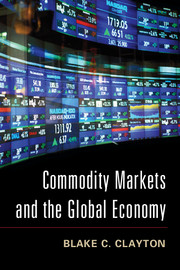Book contents
- Frontmatter
- Contents
- Foreword
- Acknowledgments
- 1 The Revenge of the Old Economy
- 2 A Twenty-First-Century Supercycle? Long-Term Trends in Metal and Energy Prices
- 3 Volatility in Global Food Markets
- 4 Commodity Markets and Financial Speculation
- 5 The Implications of Oil Prices for the U.S. Economy and Lessons Learned from the 2011 Strategic Petroleum Reserve Release
- 6 The Gold Standard as an Alternative Monetary Regime
- 7 Conclusion
- Index
Foreword
Published online by Cambridge University Press: 05 October 2015
- Frontmatter
- Contents
- Foreword
- Acknowledgments
- 1 The Revenge of the Old Economy
- 2 A Twenty-First-Century Supercycle? Long-Term Trends in Metal and Energy Prices
- 3 Volatility in Global Food Markets
- 4 Commodity Markets and Financial Speculation
- 5 The Implications of Oil Prices for the U.S. Economy and Lessons Learned from the 2011 Strategic Petroleum Reserve Release
- 6 The Gold Standard as an Alternative Monetary Regime
- 7 Conclusion
- Index
Summary
Commodity markets have been the source of extraordinary global disruptive change since the start of this century. They have also suffered the consequences of the very changes they triggered. In this sense what has occurred within the commodities sector stands alongside the growth of global terrorism, the increased failure of nation-states, the challenge to the sanctity of national borders, and the rise to prominence of China, India, and other emerging market countries and the relative decline of power and influence of the United States, Europe, and Japan as key features of the geo-economic and political landscape over the past decade and a half.
In many ways commodity markets have been at the core of global politics and economics since the start of the twenty-first century and were certainly a main feature of the last decade, the so-called “Commodity Super Cycle Era,” when prices of food, fuel, industrial metals, bulks, and gold reached ever increasing record levels at least in nominal terms until these commodity prices themselves were significantly important in driving the world economy into recession in 2008. Partly this has been a function of the growing dominance of emerging markets in the world economy and the concentration of new commodity demand, itself associated with rapid if not frenetic fixed asset investment and strong industrial production in the non-OECD world. Partly too it has been a function of the collapse of the Soviet Union and the end of bipolarity with its focus on nuclear weapons and arms control. Increasingly international politics are being played out through persistent but lower levels of conflict that have affected commodity flows and also through financial instruments – including commodity instruments – that provide “safer” ways to promote national (and often group level) objectives.
The first decade of this century was dominated by the so-called commodity supercycle, a period of time when virtually all commodities witnessed extraordinary increases in prices accompanied by equally extraordinary increases in capital investment in search of new sources of production of everything from food staples to fuel requirements to sustain growth. Simultaneously the seemingly exponential spurt in commodities prices was accompanied by, and to some degree itself driven by, an explosion of investor flows designed to tap into the expected returns from commodities.
- Type
- Chapter
- Information
- Commodity Markets and the Global Economy , pp. vii - xiiPublisher: Cambridge University PressPrint publication year: 2015



